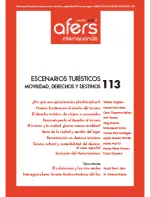The new frontiers of the study of tourism: conceptual and epistemological challenges

This article introduces the significant changes tourism studies has undergone in recent decades, describing its path from the margins of the social sciences to the centre and a place at the intersection of its parent disciplines. To face the numerous unresolved issues of tourism development and the new challenges presented by a liquid, mobile society – a society of travellers, experts and connected persons – academia has turned to new paradigms. On the one hand these allow new fundamental questions about tourism to be asked, displacing the focus of the
research from the tourist and the industry to their practices, the material nature of the space in which they act, and the network of relations that they weave when creating a tourist site, while on the other hand a range of new analytical methods are articulated. This article re-examines and explores the respective nuances of those paradigms and proposes a menu of research subjects and issues arising from them.
Key words: tourism, tourism studies, paradigms, epistemologies, interstices, transdisciplinary approaches
>> The full text articles of this issue are available only in Spanish language
https://doi.org/10.24241/rcai.2016.113.2.15